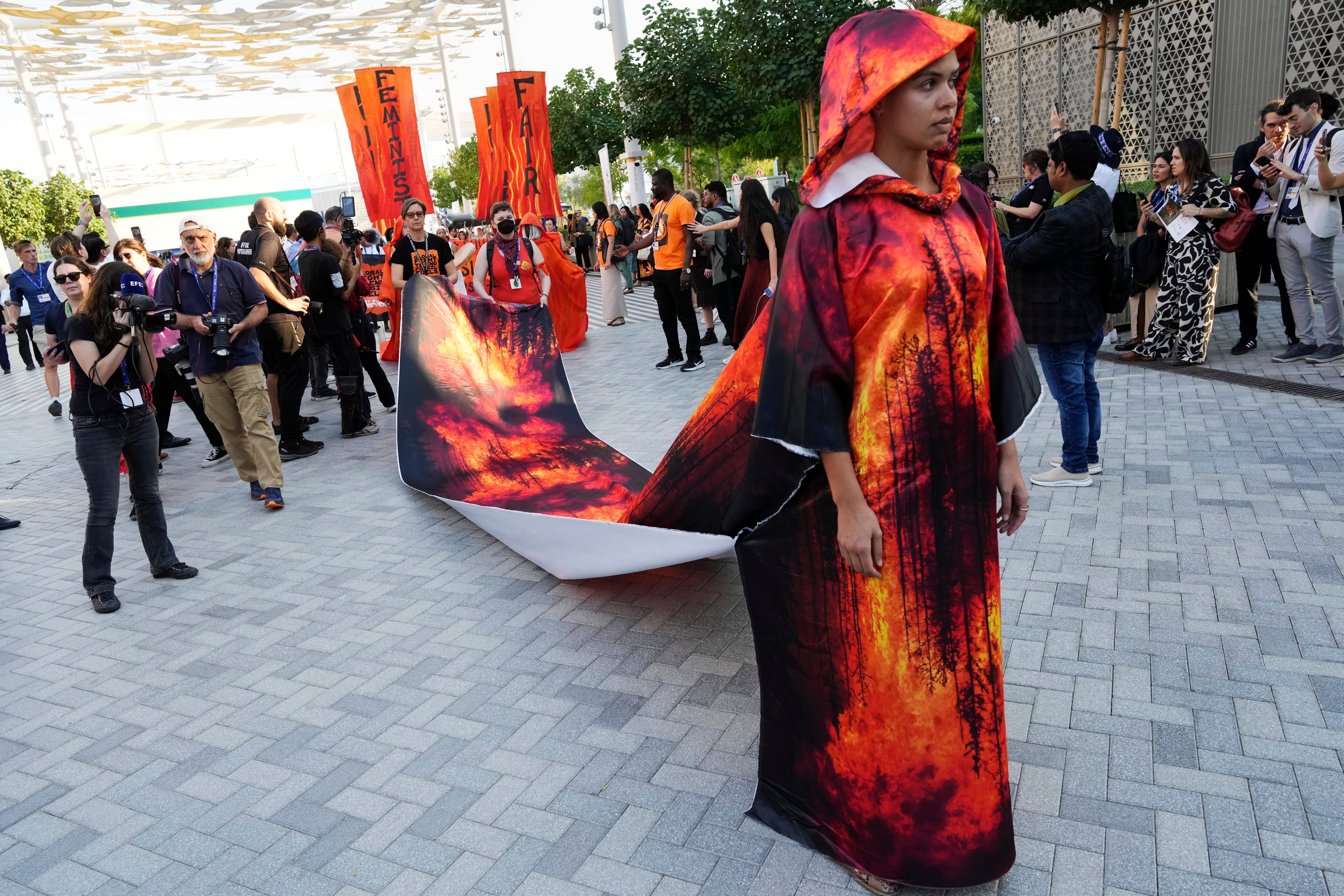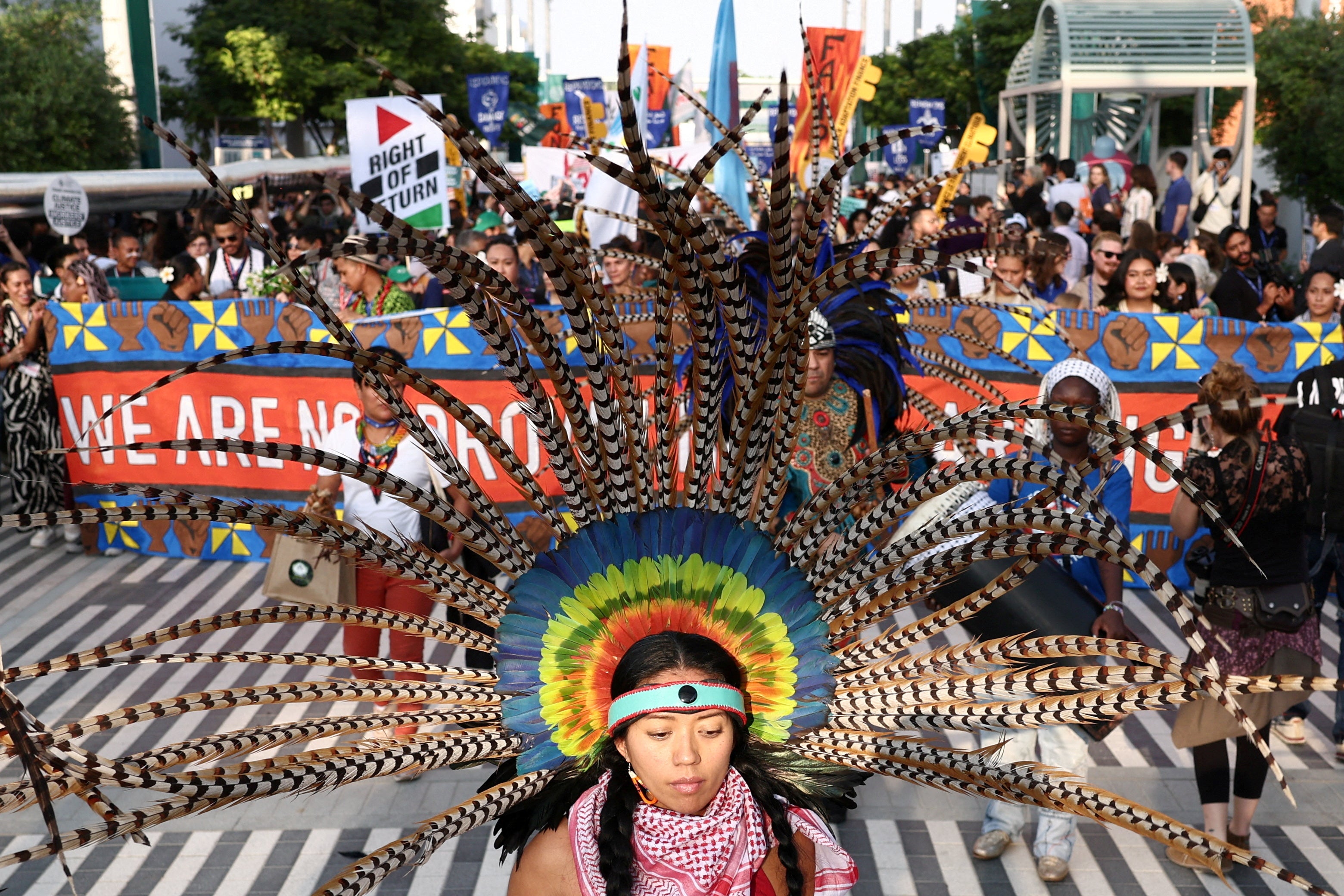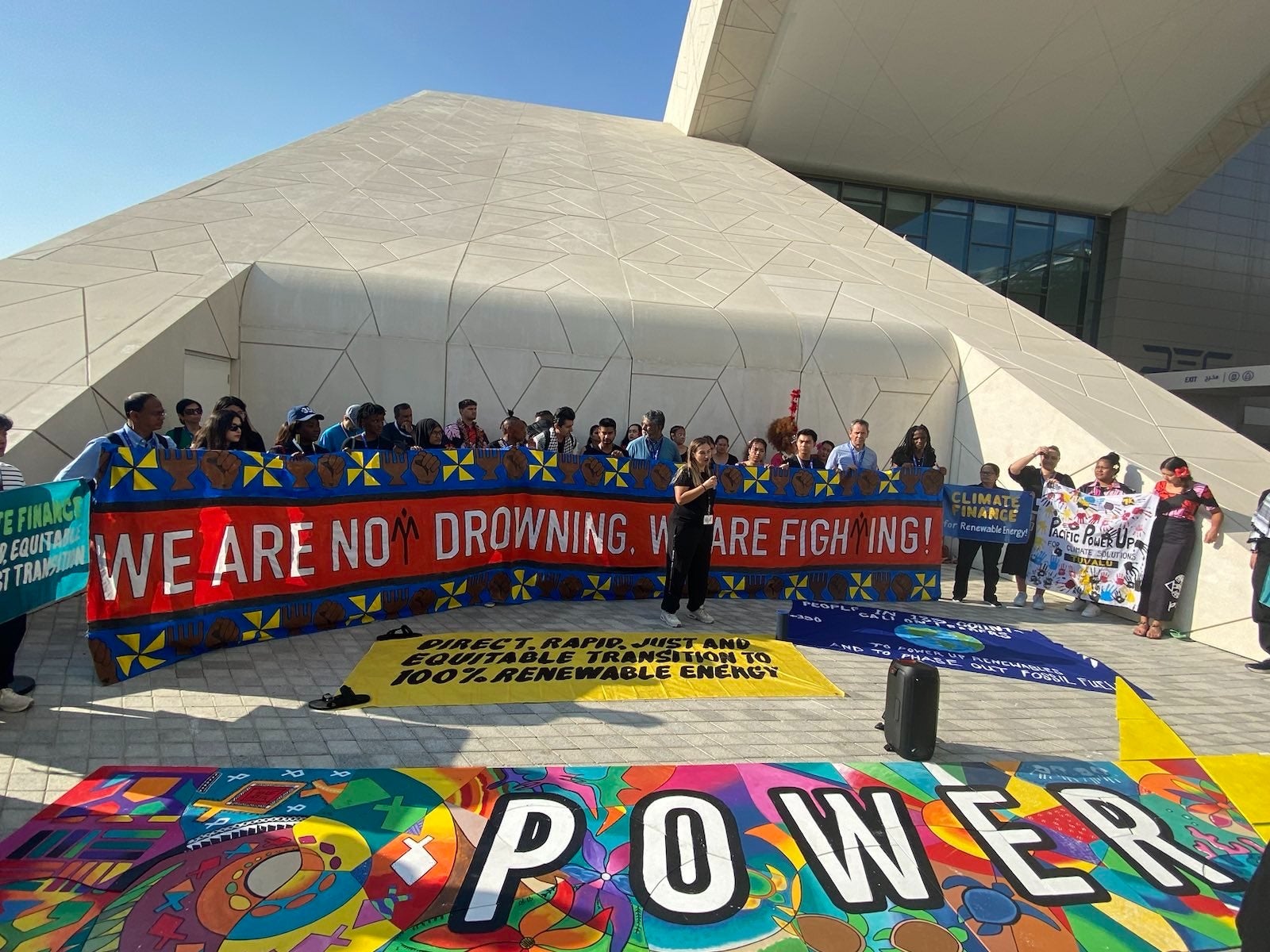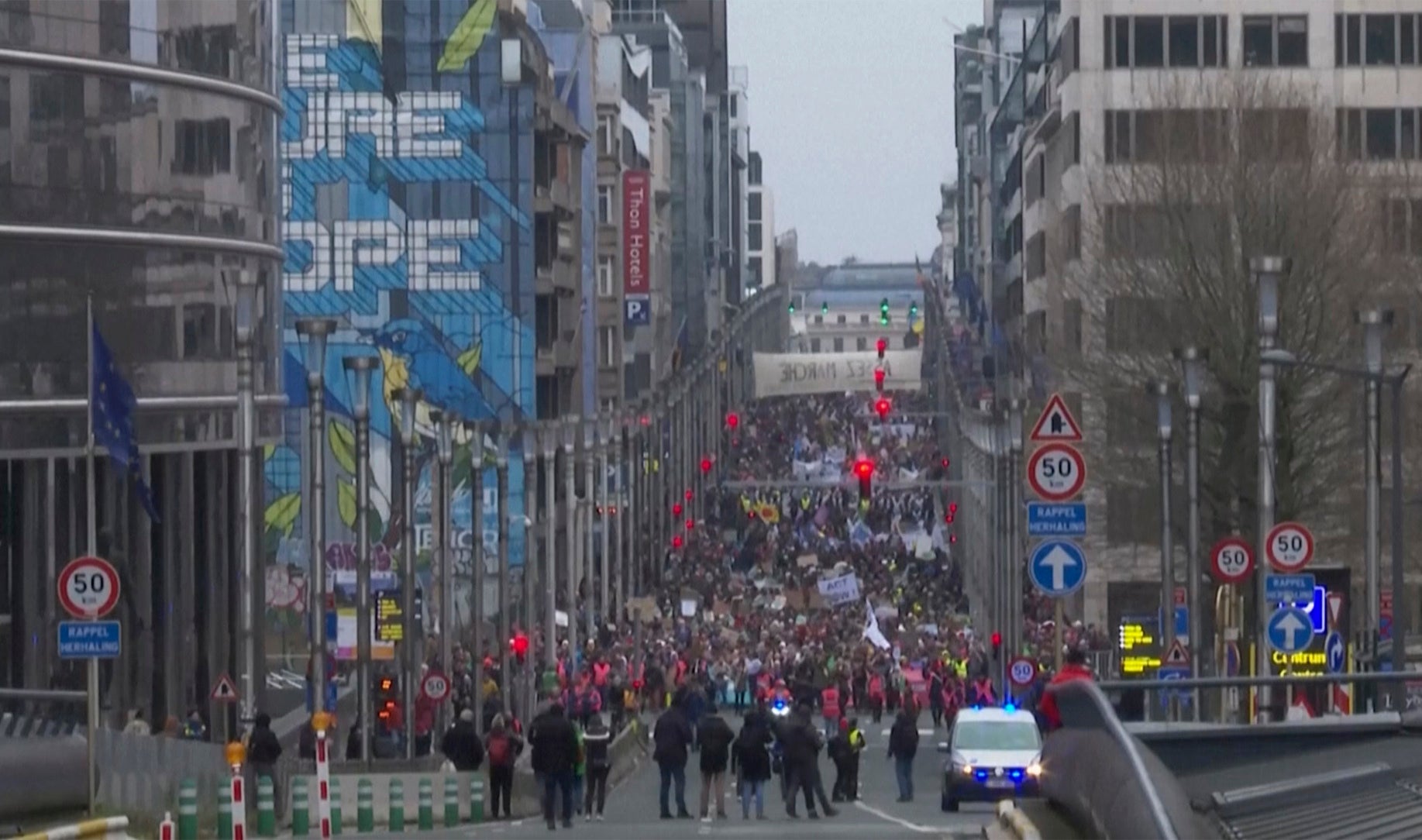Climate activists say space for protest has shrunk at Cop28
‘The more space they take, the less we get,’ say demonstrators who fear their voices are not being heard at the UAE-hosted talks. They speak to Stuti Mishra at Cop28 in Dubai


Your support helps us to tell the story
From reproductive rights to climate change to Big Tech, The Independent is on the ground when the story is developing. Whether it's investigating the financials of Elon Musk's pro-Trump PAC or producing our latest documentary, 'The A Word', which shines a light on the American women fighting for reproductive rights, we know how important it is to parse out the facts from the messaging.
At such a critical moment in US history, we need reporters on the ground. Your donation allows us to keep sending journalists to speak to both sides of the story.
The Independent is trusted by Americans across the entire political spectrum. And unlike many other quality news outlets, we choose not to lock Americans out of our reporting and analysis with paywalls. We believe quality journalism should be available to everyone, paid for by those who can afford it.
Your support makes all the difference.Protests have been an important feature of the UN’s climate summits since Cop1 in 1995, when the world paid little attention and just a few hundred government officials gathered in Berlin.
That was unrecognisable from the Cop28 talks under way amid the glittering skyscrapers of Dubai, sprawling across the vast complex of Expo City and with the eyes of the world watching as negotiators try to agree a strong deal to phase out the use of fossil fuels.
Yet while the Conference of the Parties has kept on growing as the need for climate action gets more urgent, the space for protest at the summit has dramatically shrunk in the last two years, with these talks standing in stark contrast to the vibrant and populous spectacle witnessed at Cop26 in Glasgow, where thousands marched on the roads demanding climate justice.
Expo City might be enormous, but the venue is located in the middle of the desert in the Dubai suburbs. Except for a few sporadic banners placed by the UAE government, most of the city might as well be unaware of the vitally important deliberations it is supposedly hosting.
Like those held in Egypt last year, the talks are taking place in a country with laws that tightly restrict freedom of speech and assembly, and while the UN is supposed to provide space for activism in the venue’s core blue zone, which it controls, climate demonstrators are finding that, in practice, the space they have to navigate is extremely limited.
Multiple activists The Independent spoke to said they had been met with censorship and had permission to stage demonstrations refused, both in the blue zone and in the more corporate green zone, which the UAE presidency manages.

The UN actually accredits protesters at Cop conferences, such is their formalised presence. Yet some said they had been threatened by the authorities with having their yellow activist badges removed – a process that would lead to their deportation, since visas to visit Dubai for Cop are attached to UN accreditation.
Asad Rehman, lead spokesperson for the Climate Justice Coalition, which has planned many demonstrations across multiple climate summits including Cops, says some of the group’s protests were “arbitrarily shut for a number of reasons”.
He tells The Independent that after an early protest included messages of solidarity with the Palestinians, the number of places in the vast venue dedicated to demonstrations was deliberately “reduced”.
“The atmosphere has definitely changed,” he says. “I would say specifically because of the issue of Palestine, and the restrictions around that have meant that there’s been much, much tighter control around those issues.”
He refers to a protest “where we organised the action in solidarity with the Palestinians, reading out their names. [The venue] miraculously overnight became a fountain.”
Rehman says “some individuals were being told they would be debadged if they wore a badge for calling for ceasefire”. Other activists also voiced similar concerns.
Activists say the UAE’s strict laws against public assembly make it all but impossible to plan any activism outside the summit venue.
But even the protests that are happening within UN-managed areas tend to be isolated to parts of the large complex that get less footfall – lost amid a maze of similar-looking glass buildings housing the pavilions of different countries and corporate entities, activists say. “The zones in which we are able to do actions have been moved,” Rehman says. “Some are, shall we say, less than visible.”

“Civil society space has shrunk in so many different ways in recent years,” says Amalen Sathananthar, a member of advocacy group Arctivist.
“Back in Paris [in 2015] we had open spaces everywhere around the Cop to do our [protest] actions,” he says. In Dubai, demonstrations are restricted to “one or two locations” and activists are no longer in the “high-visibility areas”.
While young climate warriors from different parts of the world are now trying to make their presence felt more as the talks enter the crucial second week, they say they are vastly outnumbered by oil and gas lobbyists and other businesses.
“It has always been really tough for civil society to protest. It’s almost like, if you’re wearing a yellow [activist] badge, it’s a penalty,” says Aderonke Motunrayo Ige, a climate activist from Nigeria.
“The way other people have access in the negotiations room, civil society never had that access.
“When you take a look at people who are present in the room, it’s mind-boggling that we find corporations responsible for pollution, and you find a lot of lobbyists.”

The number of fossil fuel executives present at this year’s conference is triple the number who attended last year’s event in Egypt, according to new analysis from climate campaigners.
Ige says it’s a clear threat to civil society’s presence.
“The more space they take, the less we get,” she tells The Independent.
Before the summit, the UAE assured environmental defenders that they would be able to “peacefully assemble” in the designated areas. But even doing so in these zones requires an extensive amount of paperwork, which must be signed off by the Cop organisers, and some activists said they were told they must apply with at least 36 hours’ notice.
In response to questions sent by The Independent, a Cop28 spokesperson said they had allotted designated spaces for “all voices to be heard” at the summit. Neither they nor a UNFCCC (United Nations Framework Convention on Climate Change) spokesperson responded to specific concerns raised by activists over fears of debadging.
“As part of our commitment to delivering an inclusive Cop, Cop28 has dedicated spaces and platforms for all voices to be heard across both the blue and green zones,” the spokesperson said.
“We continue to welcome applications to Cop28 Voice for Action Hub, where people are already assembling peacefully around a variety of topics,” they said, referring to the protest space in the blue zone.
“All applications in the blue zone are reviewed exclusively by UNFCCC under the longstanding guidelines determined by them. Applications in the green zone are managed by the host country and are reviewed using the same UNFCCC guidelines from the blue zone.”
A UNFCCC spokesperson said they are “committed to upholding the rights of all participants, to ensure that everyone’s perspectives are heard and their contributions to the climate challenge are recognised”.
“UNFCCC has received a total of 167 action submissions, already surpassing the overall number of submissions for Cop27 (153). As of the first week of Cop28, 88 of these actions have been successfully executed, with seven being cancelled by the organisers, five identified as duplicates, and the rest to be processed for future dates.
“This results in an average of 14 actions per day similar to the average of last year. In a small number of specific cases the UNFCCC secretariat are working directly with those requesting actions to ensure that the code of conduct can be adhered to.”
However, some activist organisations have opted to stay away from the talks altogether, staging protests in their home countries instead, where they have a better chance of being seen and heard.
On Saturday, protesters from Extinction Rebellion and other campaign groups joined a demonstration outside BP’s offices in London.

In the Netherlands, activist group Just Stop Coal blocked a coal-carrying train on 4 December to urge the Dutch government to support the phasing out of fossil fuels.
One group said their request to organise a demonstration at the office of UAE flag-carrying airline Emirates in the green zone was rejected by the UAE at the beginning of the summit, with officials citing a violation of unspecified guidelines.
The would-be organisers of the protest said that despite claiming to permit free speech, the UAE presidency did not even green-light a “photo op asking Emirates to be a climate champion”.
“It seems the UAE is more invested in protecting its image and fossil fuel profits instead of being a true climate leader. This is exactly what civil society groups feared would happen,” Ewan al-Haddad, the campaign director planning the protest, told The Independent.
“No matter how many countries pledge commitments, until polluting industries like airlines also start paying into the fund, it will keep falling short,” he added.
Join our commenting forum
Join thought-provoking conversations, follow other Independent readers and see their replies
Comments